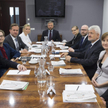The Intergovernmental Panel on Climate Change (IPCC) states that halting global warming at 1.5 degrees Celsius will require rapid and far-reaching efforts. Is the world ready for it?
Michał Kurtyka: As far as the talks I am conducting with other countries are concerned, there is a will to reach an agreement in Katowice. That is why we would like to create the conditions in which it will be possible to find some common ground among the positions of the states.
There is undoubtedly a very difficult discussion ahead of us. The IPCC report is one of the important contributions to it. Another element is the operationalisation of the Paris Agreement, i.e. the Katowice rules, on which many thousands of negotiators will work from the first day of the meeting.
The first week will be more technical, the second – political. Then ministers from all over the world will come together. This is where the report will be presented.
I hope that we will be able to reach an agreement and that Katowice will go down in the history of global climate policy in the same way as Kyoto or Paris before.





















